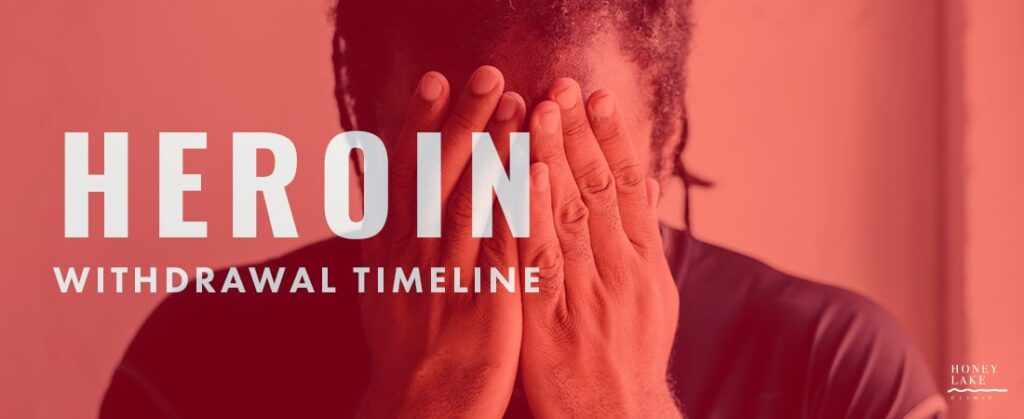Heroin Withdrawal Timeline
Did you know there’s an opioid epidemic sweeping the nation?
The Centers for Disease Control and Prevention (CDC) reports that heroin abuse has doubled for Americans aged 18-25 in the past decade. Stories of heroin abuse, addiction and overdoses are in the headlines every day. It is impacting families everywhere.
If you or a loved one has developed a heroin addiction, seek help immediately. Speak confidentially with a counselor right now. Make the call. (888) 837-6577.
Heroin is highly addictive. Because of its dangerous withdrawal symptoms, those who are dependent on heroin are best served in an inpatient medically supervised detox program. What does heroin withdrawal look like?
A Range of Withdrawal Symptoms
Heroin withdrawal will not be the same for everyone. Depending on how long you’ve been using heroin, how you used it, and how much you’d take each time, symptoms of your withdrawal will vary. If you have a history of mental illness or it you’ve been through prior withdrawals, you may have a more intense withdrawal experience.
Heroin is an opiate drug that suppresses some of the functions of your central nervous system, like your heart rate, blood pressure, respiration, and temperature regulation. It also binds to opioid receptors, increasing chemicals in your brain that are responsible for feelings of pleasure.
During withdrawal, you may experience the opposite of the intoxicating effects. For instance, instead of euphoria, reduced heart rate, and sedation, you may experience low mood, anxiety, and rapid heart rate, among other symptoms.
Heroin withdrawal symptoms may include some or all of the following:
Mild withdrawal symptoms
- Nausea
- Abdominal cramps
- Tearing
- Runny nose
- Sweats
- Chills
- Yawning a lot
- Muscle and bone aches
Moderate withdrawal symptoms
- Vomiting
- Diarrhea
- Agitation
- Restlessness
- Tremors
- Trouble concentrating
- Goose bumps
- Fatigue
Severe withdrawal symptoms
- Anxiety
- Insomnia
- Depression
- Hypertension
- Rapid heart rate
- Muscle spasms
- Impaired respiration
- Difficulty feeling pleasure
- Drug cravings
Withdrawal from heroin isn’t generally considered life-threatening on its own, however, some of the medical and psychological symptoms can have complications that can become life-threatening. Depression may lead someone to consider suicide, for instance. The support of medical and/or mental health professionals who can employ multiple methods for managing the side effects of withdrawal and keep you safe while you are recovering is vitally important.
Heroin’s Withdrawal Timeline
Heroin is a short-acting opioid, meaning that it takes effect rapidly but also leaves the bloodstream quickly. Typically, heroin withdrawal symptoms start within 6-12 hours of the last dose, peak in 2-3 days, and last 5-10 days in total duration.
Choosing a treatment facility which offers both medical and mental health oversight can be the very best opportunity for getting your recovery off the ground. The National Alliance on Mental Illness (NAMI) reports about half of all drug abusers also suffer from mental illness, which can affect the duration and treatment methods employed during your detox and throughout your substance abuse recovery.
Emotional withdrawal symptoms related to heroin, such as depression and anxiety, may be more prevalent in someone who also has a history of mental illness or an underlying mood disorder. When heroin stops being active in the bloodstream, individuals may notice a dip in dopamine levels, which can result in a crash of emotions. Being in a supportive and calming environment during the peak of these symptoms can help you get through the process more easily.
Is someone you love struggling? We know it is scary. We can help.
Don’t let an opioid addiction take over your life. Our staff is standing by to answer any questions you might have about drug abuse, addiction, or treatment.
It’s important to recognize, abuse and addiction don’t happen in a vacuum. The path to recovery and wholeness involves getting to the root the problem. To get at underlying hurt and bring lasting healing takes a holistic—spirit, mind and body—approach to addiction diagnosis, management and treatment.
At Honey Lake Clinic, our experienced doctors and staff strongly believe that faith-based treatment, encompassing spiritual, physical and mental health, will help clients and their families bring spiritual power and clearer psychological understanding to their healing and recovery.
